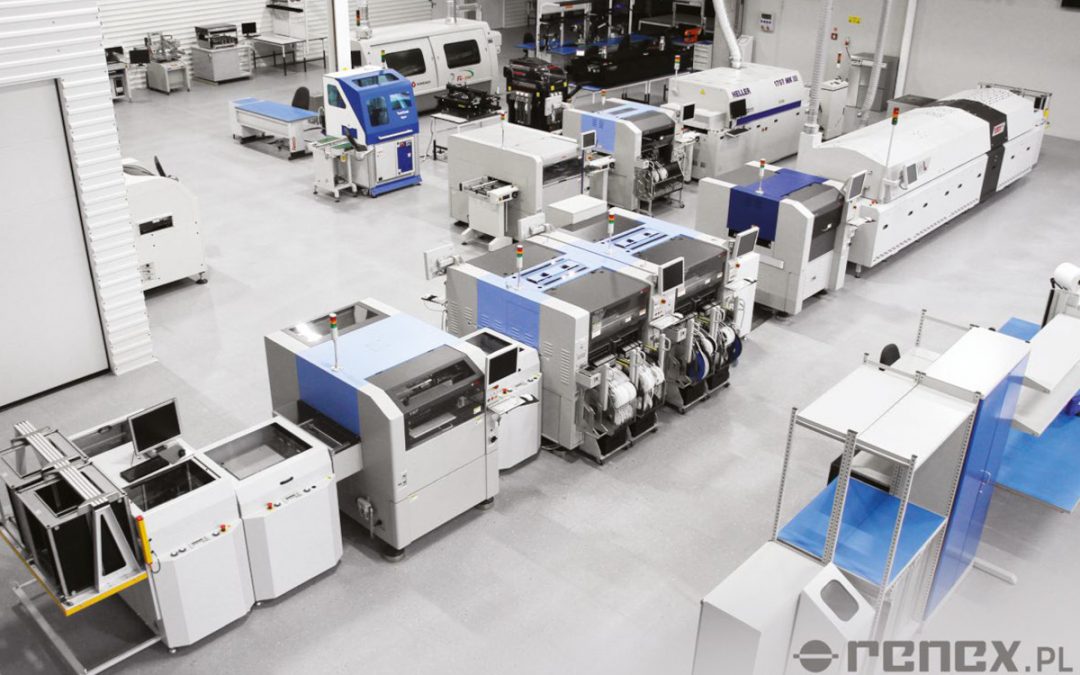The events of recent years and weeks have shaken up the geopolitical order and trade connections as we knew them. Just a few years ago, moving production to distant countries with lower labor costs seemed to be the only appropriate business model. Labor in Europe and highly developed countries was simply too expensive. Today, the situation is very different. The stability and certainty that accompanies local operations has become a much more important factor than the seemingly greater financial outlay.
For many companies, for example, those that have so far used foreign EMS services, this means entering a whole new reality – producing components for their own products or, as an alternative, looking for local subcontractors. This means that electronic packages that have so far “arrived” ready will, in many cases, be realized within their own structures – at companies in Europe and Poland.
The problem that companies implementing this new model of operation face is difficult in that it is often posed to the internal structures of companies that do not have adequate experience in electronics assembly. At the same time, the new task is multidimensional. This is because it often concerns both the sphere of knowledge that must be acquired and the infrastructure that must be created and installed in the parts of production facilities designated for this purpose.
In this paper, we will look at the problems that companies face when they want to start producing electronic packages for their own use as well as their possible solutions.
Knowledge
It is no secret that highly developed countries, including those in Europe, are facing shortages of engineering personnel. In recent decades, the development of these economies has naturally gravitated toward management, services and consumption, with technical skills receding into the background. This has resulted in a significant break in the sequence of transferring and expanding knowledge in a teacher-to-student scheme. Many professionals in these countries have retired without having passed on knowledge to the next generation. This is a situation that is difficult to rebuild.
A similar phenomenon has also taken place in Poland, where until a dozen or so years ago, technical and vocational schools and related majors were often seen as a “second choice” for those who failed to get into high schools and more prestigious universities. Fortunately, thanks to the fact that the phenomenon did not last as long in Poland as in Western European countries, the effect is not as extreme as there, although the shortage of specialists with varying degrees of experience is still noticeable in Poland.
This causes an obvious problem for companies wishing to start manufacturing electronics in-house. Often the specialists needed – production line designers, equipment operators, PCB designers or people experienced in automated and manual assembly of electronic components – are simply not available. The emerging solution, of course, is to train your own staff for this new sphere of activity. Given how specialized this knowledge is and how many scopes it touches, this is obviously not a task that can be easily accomplished internally. The solution to this problem may be to establish cooperation with an entity specialized in the sphere of consulting and training.
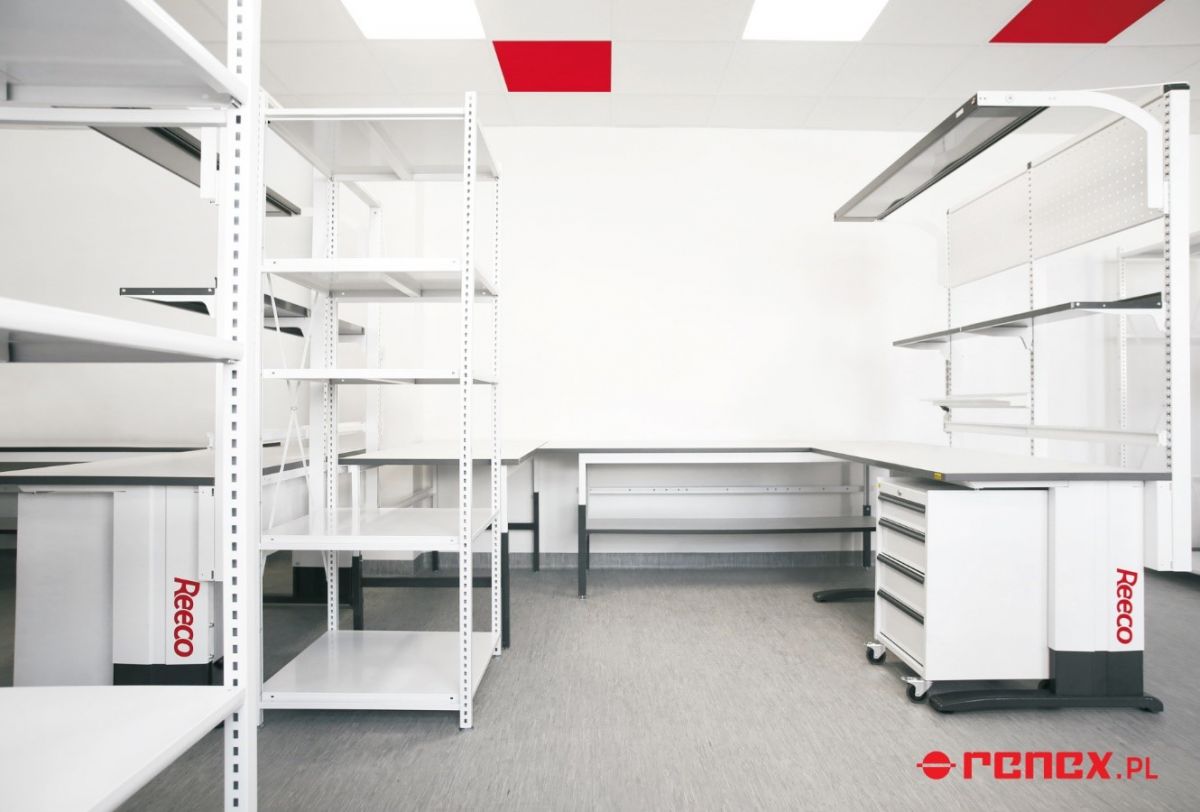
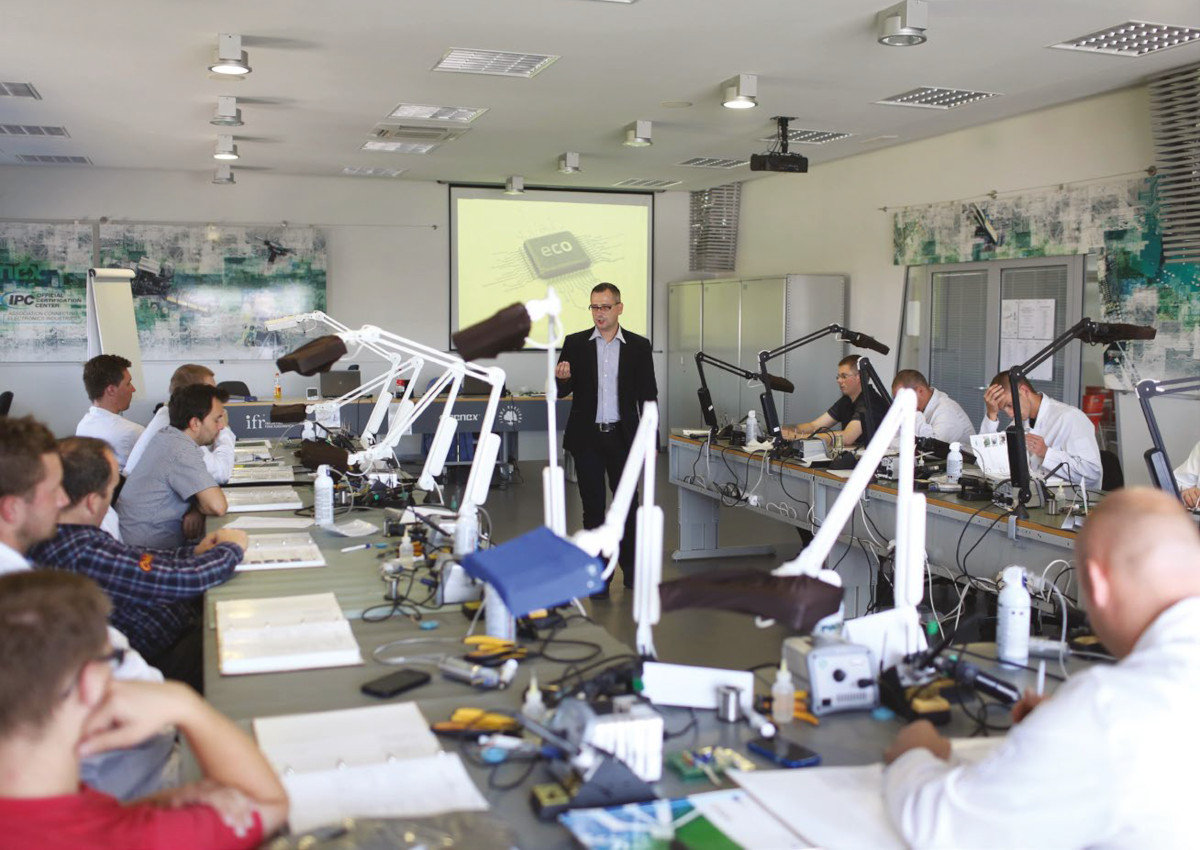
The entity comprehensively implementing this type of support is Renex Group – one of the largest and longest-established Polish companies in the electronics industry. Through the Renex Technology and Training Center, which it founded, it provides a wide range of consulting, R&D and training services designed to support the development of its Partners and Customers. Two units can be further distinguished within this activity: an authorized IPC training center and an authorized Yamaha training center.
The former, an authorized IPC training center, is the largest of its kind in Central and Eastern Europe and offers training for electronics engineers covering the full range of IPC standards, courses on antistatic protection issues, and custom-designed courses on electronic component assembly standards.
This means that entities wishing to start their own production of electronic packages have the ability to educate personnel with the relevant theoretical knowledge by taking advantage of the courses offered by this center. What is important is that the Center’s trainers have nearly 20 years of experience and have trained more than 30,000 specialists at home and abroad, which allows them to select, together with the interested entities, courses precisely and individually tailored to the needs of a given situation and the level of knowledge of the participants. The center has the authority to conduct training courses and grant authorizations even at the level of IPC Certified Trainer.
The latter unit – an authorized Yamaha training center – expands the range of available courses to include issues of proper operation of industrial equipment and robots used in electronics manufacturing. This means that those aiming to enter this sphere of activity can acquire here the knowledge of how to achieve efficient production and high-quality products with the use of professional assembly equipment.
With test production lines present and available, fully reflecting the highest standards of real production facilities, trainees have the opportunity to learn on equipment that is actually used in practice. The center is equipped with solder paste printers, Pick&Place machines and AOI systems from Yamaha, solder waves, X-ray inspection equipment from SEC, portable cleanbox clean rooms, rework equipment or universal industrial robots from Yamaha, and many more. In addition, many models of the REECO series of robots decorated with the TERAZ POLSKA emblem and, developed as part of the R&D activities of this Center, are available for training participants. The technical base is supplemented by a metalworking park, as well as a modern powder coating plant.
Combined with the experience of the Center’s specialists – gained from a wide range of RENEX Group activities – this equipment allows to train new operators of production equipment and robots and develop their skills so that they take full advantage of the capabilities and achieve full efficiency of the assembly lines they operate.
What is important, the center’s support does not end in the training sphere. The specialists carry out further cooperation with interested entities – in consulting they help to improve and “fine-tune” subsequent production processes, as well as through their decorated* service specialists provide technical support, logistics and equipment implementation services.
Equipment
The second key problem for companies considering to start producing electronic packages for their own use locally in the current geopolitical situation is the selection of appropriate – very broadly defined – equipment for new internal company structures. Key factors for the right decisions here will include consideration of such factors as the expected short- and long-term scale of production, the technological complexity of the projects, production requirements such as the need for implementation in ultra-clean zones, the extent of ancillary activities – research and development, or the need for prototyping, and so on.
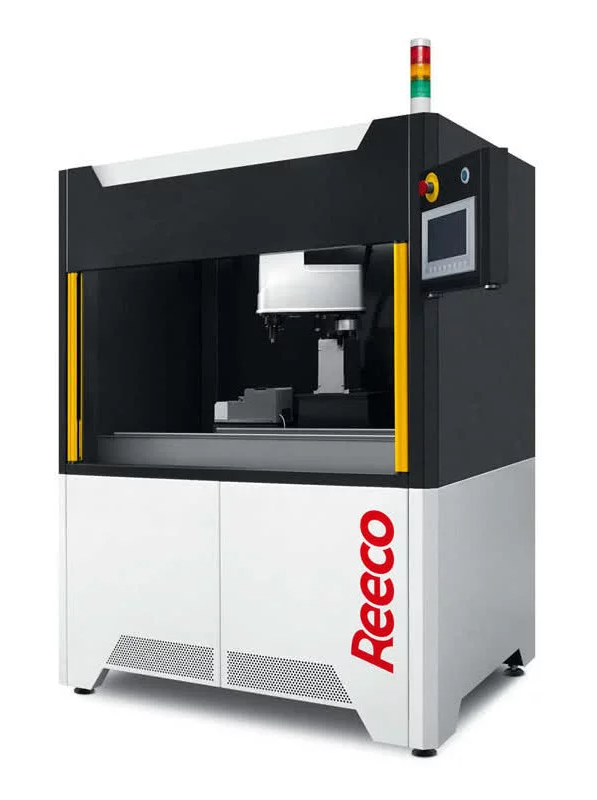
Proper analysis of these and many other factors and knowledge of what solutions should be used in a given situation will allow the creation of efficient and, especially importantly, further expandable and adaptable production lines for future circumstances. Undoubtedly, companies considering starting in-house electronic production may not have the necessary know-how to carry out this difficult decision-making process.
The answer to this may also be the establishment of cooperation with an experienced consulting entity and equipment supplier. RENEX Group, through its specialists – Technical and Commercial Advisors, assists interested entities in the selection of solutions suitable for them. As part of its activities, the Group aims to provide the widest and most comprehensive range of products necessary for the production of electronic packages, so that entities starting this type of activity can select and fully equip newly created structures in a single cooperation.
RENEX’s product range covers the full range of essential equipment components – from small equipment and consumable items to complete, advanced production lines, and is carried out through both distribution operations and its own production. It includes such global RENEX partner brands as Yamaha, Heller, JBC, Pace, Tagarno, Indium, Microcare, Piergiacomi, Gerfrlot, SEC, and HGTECH.
What’s important, the Group is Yamaha’s exclusive partner in terms of SMT production equipment and industrial robots, which allows automation of both standard elements of production lines in the industry – based on ready-to-operate pick & place machines, stencil printers and AOI systems – and non-standard ones – depending on the individual needs of a given company – such as handling and packaging of finished products.
Crucial comprehensiveness of the offer also manifests itself in a wide range of security and equipment for EPA zones. Spaces of this type, largely as a result of the increasing miniaturization of electronic devices, have become an integral part of electronics production. Acting with the idea of providing all the elements that are necessary to ensure ESD safety, the Group not only provides the aforementioned training and consulting services, but also conducts audits of functioning zones and carries out the creation of new ones. In doing so, the Group provides both total solutions and construction equipment for EPA zones such as GERFLOR brand anti-static floors.
In terms of ESD equipment, the Group supplies created in-house, specialized REECO brand furniture and clothing. The brand’s furniture is a modular solution whose design allows it to be easily adapted to the requirements of a given work environment. This is in line with the principles of designing ergonomic solutions – both reducing the risk of occupational diseases and featuring high process efficiency. The mentioned modularity, combined with the quality and availability of the offer, maintained consistently over the years, is particularly important for new users who choose these solutions. This is because it allows them to further expand and modify their workspaces as their production of electronic packages evolves.
For those starting their own production of electronic packages, REECO’s offer of customized ESD protection, and especially workwear, will also be important. The materials used do not generate dangerous levels of electrostatic discharge – which could damage sensitive electronic components. At the same time, they are created to provide the greatest possible comfort of use, in a wide range of cuts and colors, which can be particularly important for employees and departments implementing new tasks.
The selection of solutions for electronics manufacturing should also include an extension of the REECO Robot series mentioned earlier. These versatile, ready-to-implement robotic stations for production lines were developed by RENEX Group for the needs of the electronics industry. They allow for easy – not requiring specialized knowledge – automation of standard, but beyond SMT line components of electronic package production. Depending on the model, they can perform operations such as twisting, dispensing, coating (such as conformal coating), soldering or labeling. The flagship device in the series is the REECO Soldering Robot, designed for soldering of through-hole components on PCBs.
What is also important for users creating new spaces for the production of electronic packages in the offer – in accordance with the adopted model of comprehensiveness – in addition to large production equipment, you can also find a full spectrum of workstation equipment – including hand tools of the recognized brand Piergiacomi and soldering stations of JBC and PACE.
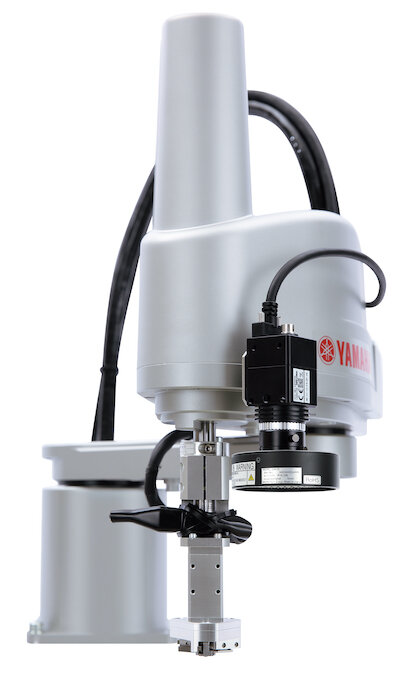
Summary
As a result of the new geopolitical situation, many Polish and European companies are considering starting on-site production of electronic packages for their own products. This process – both in the sphere of personnel training and the selection of appropriate equipment for production zones – can be significantly improved by establishing cooperation with an entity that specializes in this area – RENEX Group.
